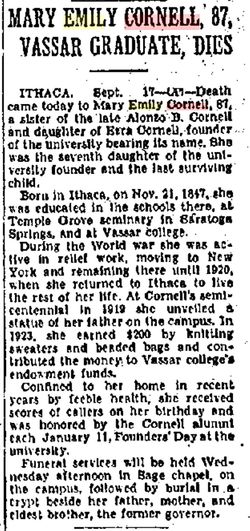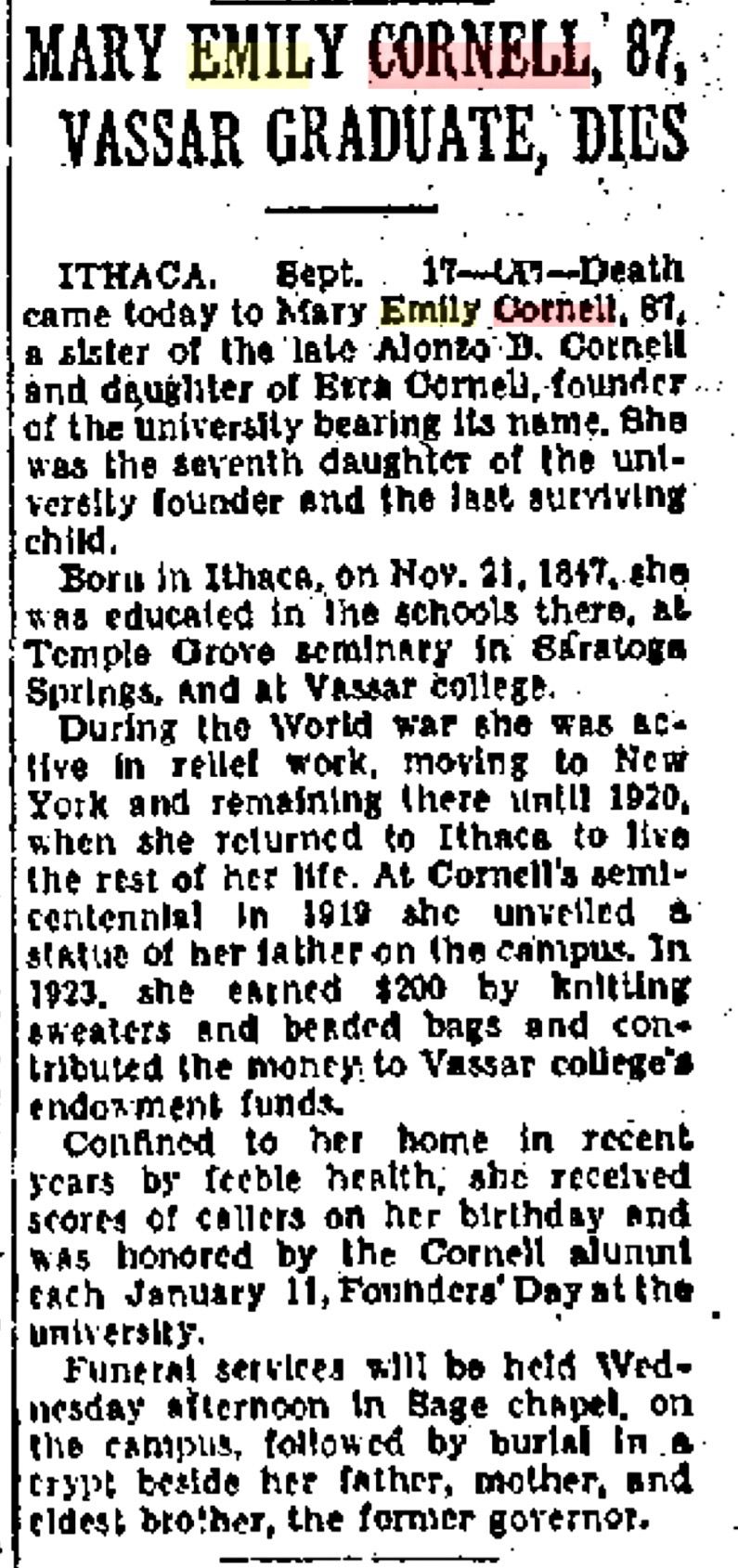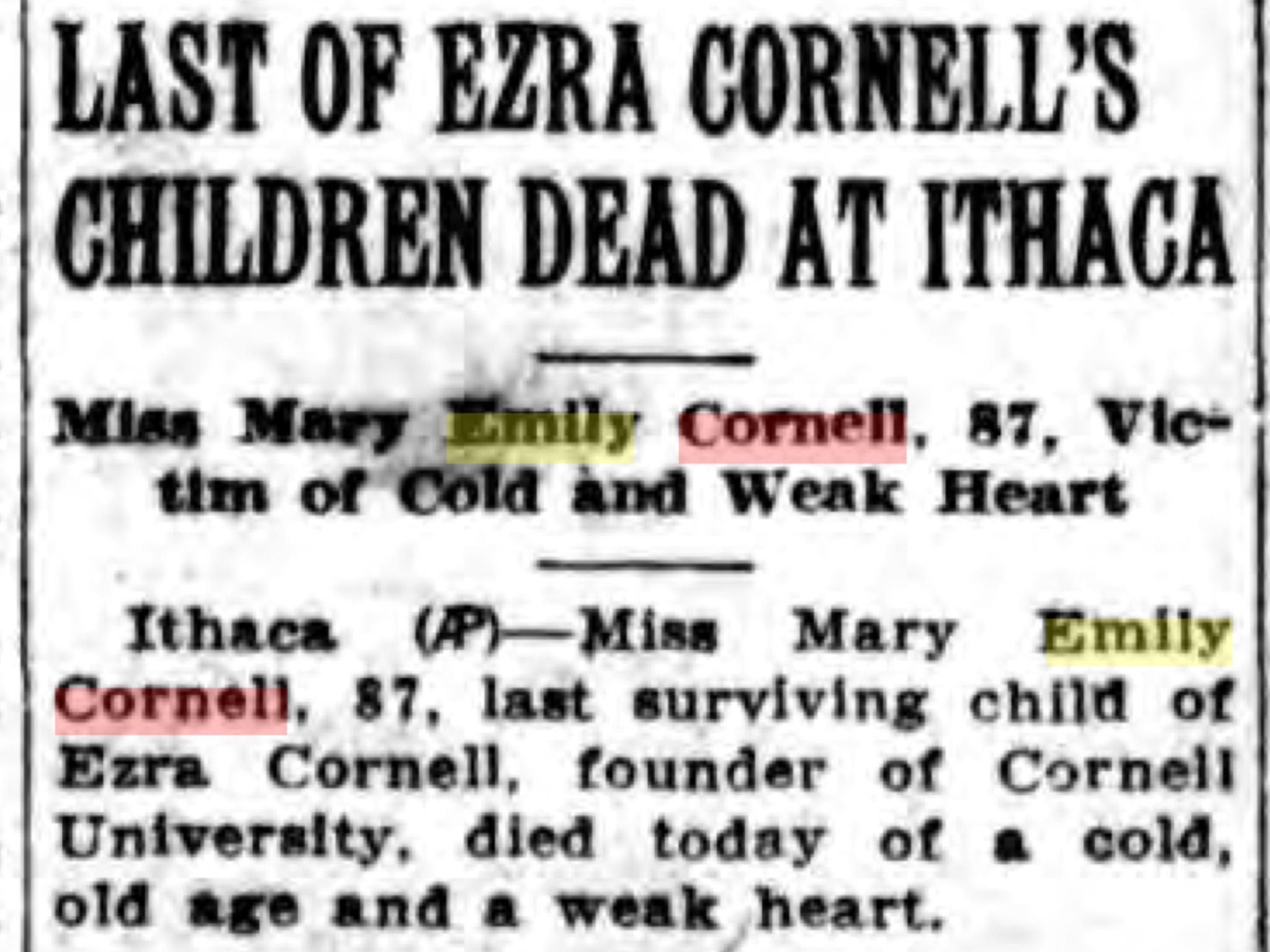Paying tribute to Mary E. Cornell at her death, President MacCracken called her, as a "member of Vassar's first class, a worthy representative of the great group of pioneers in education for women. Alert, broad-minded, intellectually vigorous to her last years and devoted to the cause of education for women.... I treasure a personal visit made to her last spring when she talked with affection of the beginning of both Vassar and Cornell. Her life united the two institutions in a bond of affectionate remembrance."
Opened in 1868, Cornell admitted its first woman students in 1879. Miss Cornell's great-neice and her namesake, Mary Emily Blair was a graduate in Vassar's Class of 1893. Published by Vassar College on September 15, 1935 and republished as part of A Documentary Chronicle of Vassar College, completed to the end of 2001 during the sesquicentennial year, 2011.
Six days days ago today Miss Mary Cornell, last child of Cornell University's great founder, ended a long and beautiful life spent -largely in the aura of the sterling institution brought into being 70 years ago by her father.
For many years Miss Cornell had been the only link with the more personal life of her father . She had carried on the traditions of her famous family , and with quite dignity had exemplified the ideals imparted to her by Ezra Cornell. Her death is not only an irreparable loss to the University and its community , but it is the culmination of a career of usefulness and integrity.
Miss Cornell was a pioneer in education for women . She was a member of Vassar college's first class , and later , when she returned to Ithaca after the founding of Cornell , she made her friends among the faculty and students, taking an active interest in the infant breathings of co-education. Later she was noteworthy for church and social work , including active relief work during the world war.
As the span of her life grew greater , her birthday became an occasion when Cornellians could pay a kind of tribute both to her and to the memory of her father . On these occasions she expressed the feeling that her father would have been thoroughly satisfied with the development of his University, and that it had filled his ideals and ambitions .
As President Livingston Farrand said upon the occasion of her death , "Her singularly vivid and loveable personality has a left a deep and lasting impression on the memories countless Cornellians who had the privilege of knowing her ."
We who lacked this happy privilege can only express deep and sincere regret on behalf of the many undergraduate Cornellians who have known and proudly
respected her personality and the ideals for
which she stood. "
Extracted from "Miss Mary Cornell", published in The Cornell Daily Sun, Volume 56, Number 1, on 23 September 1935
Biographical materials located and contributed by Starfishin [48860385]
Paying tribute to Mary E. Cornell at her death, President MacCracken called her, as a "member of Vassar's first class, a worthy representative of the great group of pioneers in education for women. Alert, broad-minded, intellectually vigorous to her last years and devoted to the cause of education for women.... I treasure a personal visit made to her last spring when she talked with affection of the beginning of both Vassar and Cornell. Her life united the two institutions in a bond of affectionate remembrance."
Opened in 1868, Cornell admitted its first woman students in 1879. Miss Cornell's great-neice and her namesake, Mary Emily Blair was a graduate in Vassar's Class of 1893. Published by Vassar College on September 15, 1935 and republished as part of A Documentary Chronicle of Vassar College, completed to the end of 2001 during the sesquicentennial year, 2011.
Six days days ago today Miss Mary Cornell, last child of Cornell University's great founder, ended a long and beautiful life spent -largely in the aura of the sterling institution brought into being 70 years ago by her father.
For many years Miss Cornell had been the only link with the more personal life of her father . She had carried on the traditions of her famous family , and with quite dignity had exemplified the ideals imparted to her by Ezra Cornell. Her death is not only an irreparable loss to the University and its community , but it is the culmination of a career of usefulness and integrity.
Miss Cornell was a pioneer in education for women . She was a member of Vassar college's first class , and later , when she returned to Ithaca after the founding of Cornell , she made her friends among the faculty and students, taking an active interest in the infant breathings of co-education. Later she was noteworthy for church and social work , including active relief work during the world war.
As the span of her life grew greater , her birthday became an occasion when Cornellians could pay a kind of tribute both to her and to the memory of her father . On these occasions she expressed the feeling that her father would have been thoroughly satisfied with the development of his University, and that it had filled his ideals and ambitions .
As President Livingston Farrand said upon the occasion of her death , "Her singularly vivid and loveable personality has a left a deep and lasting impression on the memories countless Cornellians who had the privilege of knowing her ."
We who lacked this happy privilege can only express deep and sincere regret on behalf of the many undergraduate Cornellians who have known and proudly
respected her personality and the ideals for
which she stood. "
Extracted from "Miss Mary Cornell", published in The Cornell Daily Sun, Volume 56, Number 1, on 23 September 1935
Biographical materials located and contributed by Starfishin [48860385]
Family Members
Sponsored by Ancestry
Advertisement
Records on Ancestry
Advertisement
















